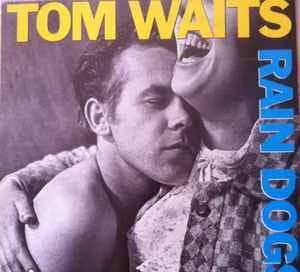The 1985 Project Part 4: Tom Waits - Rain Dogs
The first real contender for my fave album of that long-gone year
The idea of the 1985 Project is to listen to and consider as many albums as possible that came out 40 years ago, starting with the 40 highest placements in that year’s Village Voice Pazz and Jop Poll. Feel free to suggest albums I should investigate later on in the project.
Tom Waits – Rain Dogs.
You’re not supposed to forget your first time with something important, and I have distinct memories of this one. I went to visit my friend René and when I walked into her room, she was listening to this album. This was sometime in 1985. I distinctly remember her pointing out to me that Keith Richards played guitar on some of these songs. I also remember immediately falling under the spell of this album which sounded like nothing else I’d ever heard (though many of the influences would become apparent to me in succeeding years).
First and foremost, there was the way Tom Waits used his voice. I hadn’t yet learned how he used to have a more straight-forward somewhat crooning vocal approach. By the time of Rain Dogs – actually by the time of the previous album, Swordfishtrombones, Waits was growling, moaning, crackling, and dispensing sounds that nobody else this side of Captain Beefheart was approaching. Beefheart, it turned out, was a major influence on this change in his direction. Waits had married Kathleen Brennan a few years earlier, and she introduced him to the wilder, disjointed but impactful music of Captain Beefheart. And also of Harry Partch.
Partch was a composer who created his own instruments which nobody else ever used. I actually had an album by him (as well as two by Beefheart, so I guess those were my preparations for Waits) which revealed a strange completely original avant-garde music that I really haven’t thought about in way too long. The main thing Waits took from Partch was the freedom to ignore generally accepted principles of orchestration, and to use unusual percussion, along with the marimba and the harmonium, two rarely used instruments. He also decided that rather than trying to conform to current standards of pop music, he would hire inventive musicians and basically let them work together with him to arrange his songs with no previous idea of how they should sound.
In addition to Keith Richards, who plays on three songs, Rain Dogs includes performances by the wonderfully original guitarist Marc Ribot, whose ability to zig and zag rhythmically on his instrument helped define the sound of the record. There was also saxophonist Ralph Carney, formerly of the Ohio band Tin Huey, who would become a fixture with Waits for a long time. Michael Blair played many percussion instruments (as well as a bowed saw), making sure that the rhythm beds of these songs were noisy, textured, and free flowing. Other famous names dropping in here and there included Chris Spedding, G.E. Smith, and Robert Quine on guitars; Bobby Previte on percussion; John Lurie on saxophone; and Tony Levin on bass.
Waits hadn’t lost his penchant for melodic prettiness, and he wasn’t afraid of writing sentimental songs. But here he mixes in aggressive, in-your-face rhythmic recitals among the songs you could sing along with. So you’ve got “Downtown Train” and “Time,” two of the most beautiful songs of 1985, and you’ve got “Singapore,” a sort of Kurt Weill on acid number, and “Big Black Mariah,” a song full of round-house right punches to the gut.
I played this record incessantly the year it came out, and stuck with Waits for its follow-up, Frank’s Wild Years. Subsequent records have been good, for the most part, but never as full of discovery, ambition, and connection to older forms such as cabaret, New Orleans jazz, country, blues, and carnival music. For me, Rain Dogs remains the definitive Waits album, the centerpiece of his three-album reinvention as a musical artist outside genre. Obviously, there was a sizable contingent of Pazz and Jop voters in 1985 who felt this as it was happening.
I will give this one 9.5 out of 10 stars.



